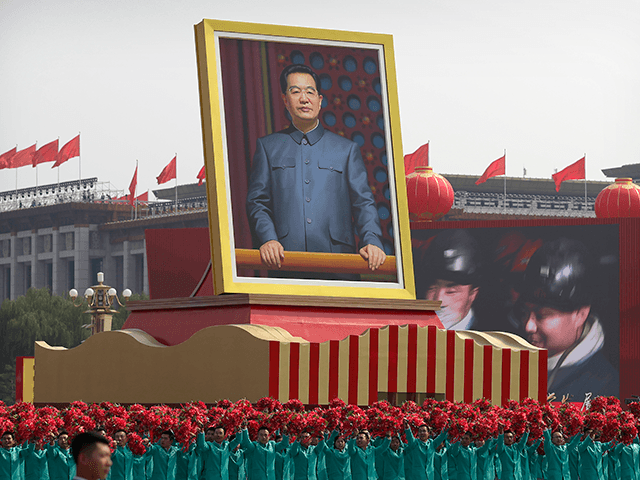A man carrying an ax and believed to be inebriated attacked the ancestral site of the Hu family, which includes dictator Xi Jinping’s predecessor Hu Jintao, and tried to hack it apart, the Hong Kong newspaper Apple Daily reported Wednesday.
The incident reportedly occurred in October of last year but the Chinese Communist Party unsealed the indictment on Monday, according to Apple. The indictment identified the culprit as a man named “Ge” and described his crime as attempting to destroy several of the doors and other outside decor of the facility, an “ancestral site” of cultural significance to the entire Hu family. Hu Jintao did not reportedly live there, but has made visits to honor the family. The site was reportedly built in the Song dynasty, which lasted from 960 to 1279.
“According to prosecution papers cited by Xinan, a drunken Ge, 49, carried an ax to the ancestral hall at 9 p.m. on Oct. 3 and whacked the door lock to enter the premises,” Apple Daily reported. “He then vented his emotions by hacking at other doors of heritage value at the monument. Relics including the entrance doors, wooden frames and the base stone were badly damaged. Repairs were estimated to total around 32,000 yuan (US$4,920), while the base stone was said to cost 300 yuan, the documents were cited as saying.”
The Hong Kong newspaper noted that, while the news initially appeared in local Chinese media, Apple could not find it on any Chinese media sites after the original article in local media disappeared.
Reports of the incident did not offer any indication that “Ge,” the suspect, attacked the facility with the intent of making any political statements, or that any evidence suggests a personal animosity towards Hu Jintao himself.
Hu was “president” of China, a title that typically accompanies more powerful ones like chairman of the Communist Party of China and commander-in-chief of the People’s Liberation Army (PLA), from 2002 to 2012. His tenure was marked by a limited public footprint and heavy emphasis on improving economic policy to grow China into the world’s second-largest economy. Unlike successor Xi Jinping, who has incorporated his personal philosophy, “Xi Jinping Thought,” into the country’s constitution, Hu kept a small profile and has largely removed himself from the public eye following the end of his presidency. While Hu has personally remained a private individual, his son, Hu Haifeng, took a prominent political position last year, taking over the local Communist Party in the regional capital of Xi’an.
Private ownership of firearms is illegal in China, which has resulted in most armed acts of violence involving knives or axes. The attack on the Hu family site is unique in that many such attacks target human victims, several including attacks particularly against children or targeting schools. In 2011, Henan province experienced an ax attack in which a man later identified as mentally ill hacked two girls and four adults to death outside of a nursery school. Similarly, an ax-wielding assailant attacked a primary school in Shaanxi province, for which Xi’an is the capital, targeting a primary school. While the man failed to fill anyone, at least seven children suffered injuries.
Axes and knives also played a prominent role in one of the most violent incidents in recent Chinese history – an uprising of ethnic Uyghur people in Xinjiang in 2013, which followed deadly riots in 2009 that resulted in severe communist crackdowns on the entire province. An incident Reuters described at the time as a “confrontation” occurred in the city of Kashgar after Communist Party monitors entered a home they had reports identifying as “suspicious.” Police soon followed, and the inhabitants fought back with knives and axes. The situation ended with the home in question burning down.
The incident occurred at the beginning of Xi Jinping’s tenure, which has been defined by his construction of over 1,000 concentration camps to house Uyghur and other ethnic minority people. Xi’s regime has insisted that Xinjiang is home to a large community of “separatists” and jihadists, necessitating the creation of “vocational training” schools where Uyghurs can learn how to properly integrate into Han-dominated society. The concentration camps are these “schools,” where the Chinese Foreign Ministry has repeatedly insisted that Uyghurs learn important job skills.
In reality, survivors of the concentration camps say that they are subject to intense indoctrination, including the worship of the Communist Party and Xi Jinping, and torture. Among the methods of torture that survivors have identified are beatings, electrocutions, and daily gang rapes. Some also say they have been subject to slave labor in the camps, as well as forced sterilization and forced abortions to prevent the Uyghur community from growing.
Both the administrations of Presidents Donald Trump and Joe Biden have deemed the actions against Uyghurs a “genocide.”

COMMENTS
Please let us know if you're having issues with commenting.